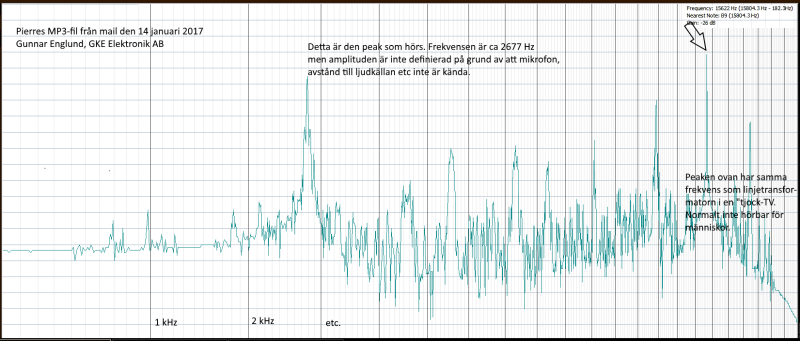Skogsgurra
Electrical
I was asked to visit a flat in southern Sweden (50 Hz land) to investigate why there were intermittent high-pitched sounds that disturbed the couple living there. I was told the usual things about stray currents, harmonics and resonances etcetera etcetera. Actually, everyone seemed to know all about the problem already.
The sound didn't appear during my visit and I told the guy to get a decent recorder and use it next time the sound appeared. I got a recording the other day. It was full of clicks and silent periods and noise but I cut most of that out, scrubbed the file and stored it: [URL unfurl="true"]https://res.cloudinary.com/engineering-com/video/upload/v1484472325/tips/Pierres_whining_sound_1_qeqb41.wav[/url]
Anyone heard tis before? There is a 15625 Hz peak that probably comes from an old TV set somewhere and that one is not audible to the elderly couple but the 2700 Hz whining sound is very intense and disturbing.
I am completely lost on this one. The electric installation is OK and there are no unexpected components in the mains voltage.
Gunnar Englund
--------------------------------------
Half full - Half empty? I don't mind. It's what in it that counts.
The sound didn't appear during my visit and I told the guy to get a decent recorder and use it next time the sound appeared. I got a recording the other day. It was full of clicks and silent periods and noise but I cut most of that out, scrubbed the file and stored it: [URL unfurl="true"]https://res.cloudinary.com/engineering-com/video/upload/v1484472325/tips/Pierres_whining_sound_1_qeqb41.wav[/url]
Anyone heard tis before? There is a 15625 Hz peak that probably comes from an old TV set somewhere and that one is not audible to the elderly couple but the 2700 Hz whining sound is very intense and disturbing.
I am completely lost on this one. The electric installation is OK and there are no unexpected components in the mains voltage.
Gunnar Englund
--------------------------------------
Half full - Half empty? I don't mind. It's what in it that counts.

